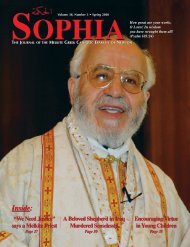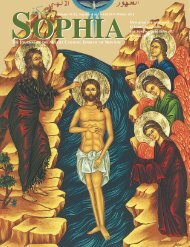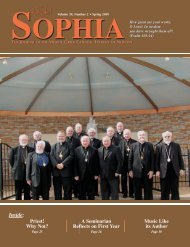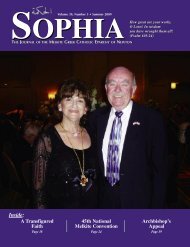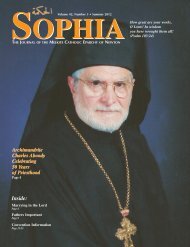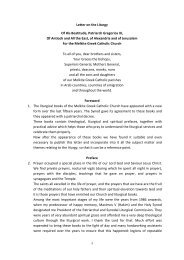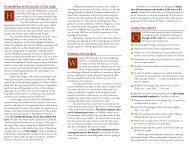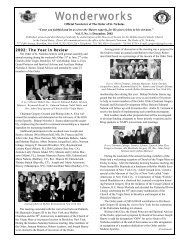Sophia - Melkite Eparchy of Newton
Sophia - Melkite Eparchy of Newton
Sophia - Melkite Eparchy of Newton
- No tags were found...
Create successful ePaper yourself
Turn your PDF publications into a flip-book with our unique Google optimized e-Paper software.
HHow are today’s people stayingnear God? Are people next toGod today? If during the seventhcentury, in Constantinople, capital<strong>of</strong> civilization and culture <strong>of</strong> then knownworld, people were debating the theologicalissues <strong>of</strong> the time in the streetsand at the market-places with great passion,and if, in India, at the beginning <strong>of</strong>last century, as the Indian Christian missionarySundar Singh tells us, there werestill people to whom Truth was a matter<strong>of</strong> life and death, now it seems that – atleast in our Western world – prioritieshave changed. It seems we are living ina time when longing for God, Heaven,Truth and Beauty have been mostlysmothered. But flares <strong>of</strong> this represseddesire happened in the more or less distantpast and even in the present.Be that as it may, our heart desiresand thirsts for a kingdom that is not <strong>of</strong>this world. Something inside us standsfor our calling and longing that cannotultimately be fulfilled in this world.The Lord <strong>of</strong> this kingdom that is not<strong>of</strong> this world, the Lord <strong>of</strong> our hearts,Jesus Christ, the Savior, has the powerto give us what we desire in a secretway, to really free us <strong>of</strong> the burdeninglife <strong>of</strong> this world resemblance, sinceHe is risen from the dead and has thepower to present us all his resurrection.No idea or spiritual exercise has thispower. They do not save us from death.They just create for a while the illusion<strong>of</strong> liberating us from the strains <strong>of</strong> ourearthly existence.We also believe that the unprecedentedspreading <strong>of</strong> spiritual and psychicdiseases is an inrush <strong>of</strong> the longing forGod concealed by the unnatural contemporaryway <strong>of</strong> life. Depressions, anxieties,neuroses diagnosed with animpressing frequency today as comparedwith some decades ago, couldhide new facets <strong>of</strong> a life lacking a truespiritual truth or sores <strong>of</strong> a contemporaryJob, run over by the steam-roller <strong>of</strong> theway <strong>of</strong> life alienated from God.Though one notices in the world thisalienation from God, the encounter withGod remains the secret <strong>of</strong> every soul.God himself knows his friends, his closeones in this world alienated from Him.To the ones close to Him, the need <strong>of</strong>staying by God is like the need <strong>of</strong> thevine-shoot to the grape-vine to live andbear fruit. For those who knew Godand then have gone astray, the need <strong>of</strong>staying next to Him is like the need <strong>of</strong>the prodigal son to return in hisFather’s arms and to the spiritualwarmth <strong>of</strong> the parental home. A for theLonging for Godby Abouna Dmitriones who did not know God, theChurch has this call: Come, we havefound the desired One. This call ismore than anything a call <strong>of</strong> love.In a tired, harassed or indifferentworld, where communication betweenpeople has become a mere exchange <strong>of</strong>information or just an opportunity tosolve selfish interests, in a world alienatedfrom God, this call <strong>of</strong> the Churchis an invitation to love. The Church hasin fact the power to give to everyonejoining her, to everyone engrafted toher Body, the One who is Love itself.Through the sacramental mysteries,especially the Holy Eucharist, Loveitself, the Savior Jesus Christ, is givento all who freely accept the invitation.We want to assert here too that wewill not earn Love just by being sensitive,idealist or sentimental. With thesemental attitudes we will not go beyondthe limits <strong>of</strong> humanity. We will notreach what our heart secretly desires.We will deceive ourselves with theillusion <strong>of</strong> a love that cannot overcomedeath. That’s why Mother Church isgraciously calling us: the Love she<strong>of</strong>fers through her sacramental mysterieshas overcome death and is given tous to overcome within us too and to fillup with the unending Love. †An Invitation to LoveWhy an Early Date <strong>of</strong> Pascha?Our calendars have always been marked by a confusion <strong>of</strong>days, planets and gods. Even today, our week begins with Sun’sDay, followed by the Moon’s Day and ending with Saturn’s Day.The month (think moonth) was originally based on the 29.5-dayperiod <strong>of</strong> the Moon, while the year is fixed by the Sun’s apparentmotion through the Zodiac. If your culture is centered on animals –fishing, hunting, shepherding – moonlight and tides will control yourlife and your calendar will follow the Moon. If you grow crops, thenseasons are more important, and a solar calendar makes more sense.The Jewish calendar is lunar; the civil calendar <strong>of</strong> Rome, setby Emperor Julius Caesar, is solar. The Catholic Church’s calendaris a holy match <strong>of</strong> both. Thus, most saints’ days are fixedinto the yearly calendar, like Christmas; but Pascha/Easter wasset by the Fathers <strong>of</strong> the Ecumenical Council <strong>of</strong> Nicaea (in theyear 325) as the first Sunday after Passover.By medieval times, our astronomy had advanced to the pointwhere it should have been possible to calculate when those lunarholy days would occur. But in practice, such calculations turnedout to be surprisingly difficult. By the sixteenth century, withChristianity spreading across the globe, it became all the moreurgent to find a simple, reliable way <strong>of</strong> letting everyone know wellahead <strong>of</strong> time when Pascha/Easter and its associated feasts were tobe celebrated.Caesar’s trick <strong>of</strong> leap years every fourth year was proving imprecise;after 1,500 years, the first day <strong>of</strong> spring had slid by ten days fromits canonical position <strong>of</strong> March 21st. Pope Gregory XIII (+1585) calendarcommittee settled on a simple and elegant solution. Instead <strong>of</strong>trying to determine with perfect accuracy the Moon’s position andthe first day <strong>of</strong> spring, they devised a formula which closely followsthe “first Sunday after Passover” rubric. The earliest that Pascha/Eastercan fall is March 22nd; this occurs roughly once every two centuries.AMarch 23rd date, such as we have this year (2008), is a once-acenturyevent; the next one will be in the year 2160.One can only hope that an “<strong>of</strong>ficial” date for Pascha/Easter bepermanently set in the Christian calendar, as it has been recommendedby the Consultation <strong>of</strong> Aleppo, Syria, in May <strong>of</strong> 1997.Winter 2008 • SOPHIA 25



